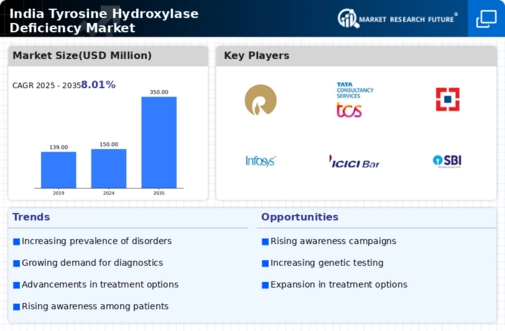Government Initiatives and Funding
Government initiatives aimed at improving healthcare infrastructure and funding for rare diseases play a significant role in the tyrosine hydroxylase-deficiency market. In India, the government has launched various programs to enhance research and development in the field of rare genetic disorders. For instance, the National Policy for Rare Diseases encourages the development of therapies and provides financial assistance for patients. Such initiatives are likely to foster innovation and attract investments in the tyrosine hydroxylase-deficiency market. Additionally, increased funding for research may lead to the discovery of new treatment modalities, further driving market growth.
Growing Investment in Biotechnology
The increasing investment in biotechnology and pharmaceutical sectors in India is a significant driver for the tyrosine hydroxylase-deficiency market. With a burgeoning startup ecosystem and a focus on biopharmaceutical innovations, there is a heightened interest in developing therapies for rare diseases. Reports indicate that the Indian biotechnology market is projected to reach $100 billion by 2025, which could facilitate the growth of specialized treatments for conditions like tyrosine hydroxylase deficiency. This influx of capital may lead to accelerated research and development efforts, ultimately benefiting the market.
Advancements in Treatment Modalities
The continuous advancements in treatment modalities for tyrosine hydroxylase deficiency are pivotal for the market's expansion. Recent developments in enzyme replacement therapies and gene therapies show promise in addressing the underlying causes of this deficiency. These innovative treatments could potentially improve patient outcomes and quality of life. As research progresses, the tyrosine hydroxylase-deficiency market may witness the introduction of novel therapies that are more effective and have fewer side effects. This evolution in treatment options is likely to attract both healthcare providers and patients, thereby enhancing market dynamics.
Rising Demand for Genetic Counseling Services
The growing recognition of the importance of genetic counseling services is influencing the tyrosine hydroxylase-deficiency market. As more families become aware of genetic disorders, the demand for counseling and testing services is likely to increase. Genetic counselors play a vital role in educating patients about the implications of tyrosine hydroxylase deficiency and guiding them through treatment options. This trend may lead to an increase in early diagnosis and intervention, which is crucial for managing the condition effectively. Consequently, the tyrosine hydroxylase-deficiency market could see a rise in service providers and related healthcare offerings.
Increasing Prevalence of Neurological Disorders
The rising incidence of neurological disorders in India is a crucial driver for the tyrosine hydroxylase-deficiency market. Recent studies indicate that the prevalence of such disorders is increasing, with estimates suggesting that around 1 in 1,000 live births may be affected by conditions related to tyrosine hydroxylase deficiency. This growing patient population necessitates enhanced diagnostic and therapeutic options, thereby expanding the market. Furthermore, as awareness of these disorders increases among healthcare professionals and the general public, the demand for specialized treatments is likely to rise. The tyrosine hydroxylase-deficiency market is expected to benefit from this trend, as more patients seek medical intervention and support.
















